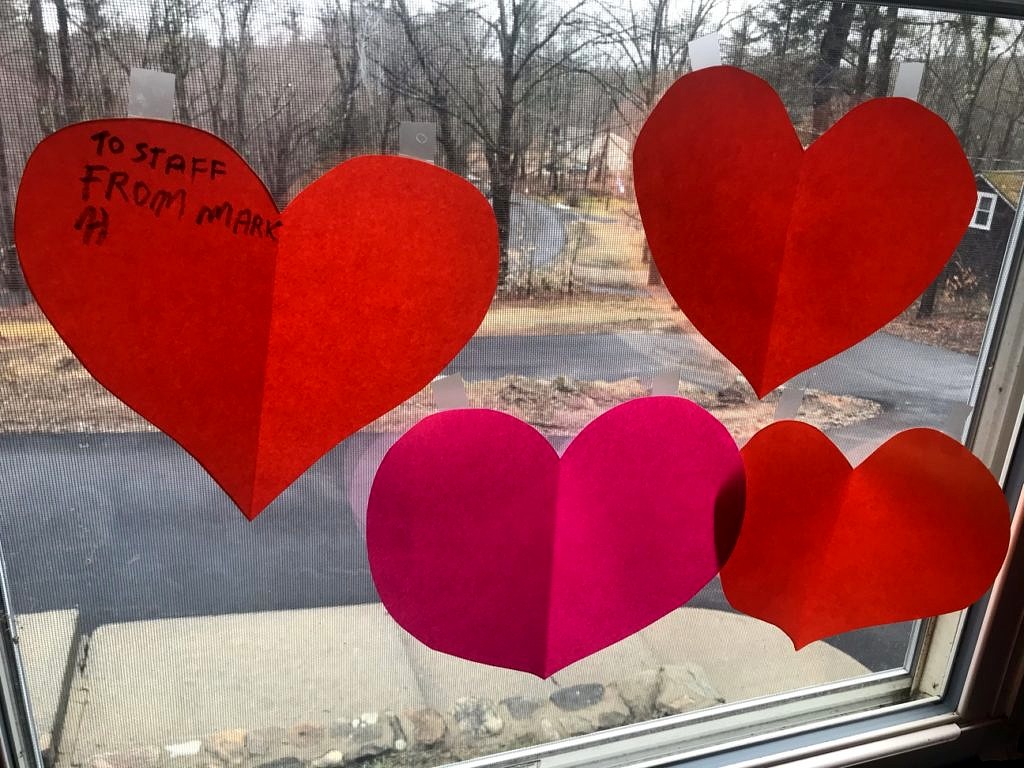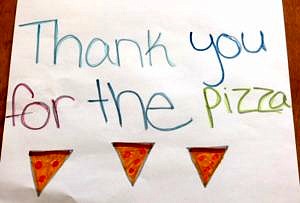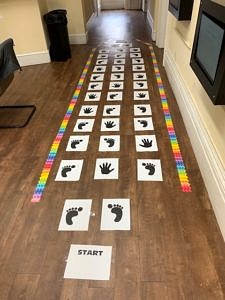
Red, pink, and yellow hearts dot the front windows of Westminster House, a group home for adults with developmental disabilities in Central Massachusetts.
The colorful paper cutouts aren’t just for decoration; each one represents a message of hope, support, and love for friends, relatives, and those on the front lines of the coronavirus outbreak that’s largely cut off residents of the home from regular activities in the community and personal contact with their families.
“Our residents feel better knowing they have a place to put their families or those they are thinking of through these times of social distancing,” said Eliza Graton, assistant program manager at the home.
With most travel, businesses, and recreational activities shut down and social distancing the new norm, staff and residents across Community Resources for Justice are finding creative ways to stay entertained, engaged, and connected. The morale-boosting, monotony-busting methods include movie nights, livestream yoga classes, cooking activities, outdoor group exercise routines, and much more.
An extra-large pizza party for Community Strategies residents
When a small team of CRJ employees loaded up their cars with pizza and subs bound for hungry residents and staff at 19 Massachusetts group homes, they were delivering more than just lunch.
With much of the country hunkered down to slow the spread of coronavirus, the five staff members were on a mission to achieve something never attempted before: a simultaneous pizza party across more than a dozen group homes, connected by FaceTime and group chats.

Josh Jenness, a Community Strategies clinician, helped deliver food to a massive pizza party across 19 group homes in Central Massachusetts.
For dozens of residents and staff it was an opportunity to relax, catch up, and, most of all, smile.
“For a brief moment in time, (the staff) made each person feel special, appreciated, and valued,” said Janet Kachadoorian, residential director for Community Strategies’ Massachusetts group homes for adults with developmental disabilities. “They brought so much more than pizza; they brought memories, laughs, and smiles.”
Residents met the staff-turned-delivery-drivers with homemade signs thanking them for pulling off the Herculean feat.

Residents of Community Strategies group homes in Massachusetts made signs to thank staff members who organized a giant pizza party across 19 different homes in Central Massachusetts.
Keeping spirits high in Social Justice Services
Like Community Strategies, residents in the Social Justice Services division’s residential programs have mostly been cooped up inside. With all non-essential businesses shuttered in Massachusetts, New Hampshire, New York, and Rhode Island, they’ve been unable to go to work, job training programs, the gym, or other approved activities to support their successful transition back into the community.
Coolidge House has brought in additional laptops and card games to keep residents happy and occupied. Brooke House staff have been leading cooking activities and group workouts across the street from the program. A section of the lobby at McGrath House has been converted into an indoor hopscotch court.

To stay active and stave off boredom, McGrath House residents and staff put together an indoor hopscotch court.
And staff at Sargent House, a residential program for young men with complex clinical needs, organized a “spirit week” with daily events, including a pajama day topped off with an ice cream social, a dressy dinner to practice proper etiquette, and a Star Wars movie marathon.
“With most of our residents’ regular routines shut down, restlessness and boredom are real challenges,” said Ellen Donnarumma, vice president for justice services, who oversees operations in CRJ’s residential reentry programs and Sargent House. “Staff have done a fantastic job getting creative and making the best of a difficult situation to keep everyone happy and healthy.”
For the Crime and Justice Institute, working remote goes even more remote
With employees scattered around the country, many CJI staff are used to not seeing their coworkers every day. But working remotely has taken on new meaning with steps to contain the spread of the virus grounding the staff’s usually fast-paced travel schedule, putting reform legislation on hold, and tying up partner corrections and law enforcement agencies.
Still, CJI-ers remain busy, even if they’re less mobile. And they’re finding new ways to stay connected to colleagues, both professionally and socially.
Team check-in phone calls have switched to video conferences. Staff use Slack, an instant messaging program, to share cooking projects, photos of pets, and TV and movie recommendations. A virtual book club is also in the works.
Recently, staffers hosted their first virtual happy hour, a modified version of their usual in-person, after work get-togethers near the Boston headquarters. From backyards and living rooms coast to coast, CJI employees toasted each other, shared some laughs, and enjoyed some sorely missed face time.
After a long week overwhelmed by headlines about the virus, the happy hour was a welcome respite.
“It was nice to feel like it was an OK time to be laughing with my coworkers,” said Abby Strait, a senior policy specialist at CJI. “It was fun to have that silly time, especially in the midst of a stressful time.”